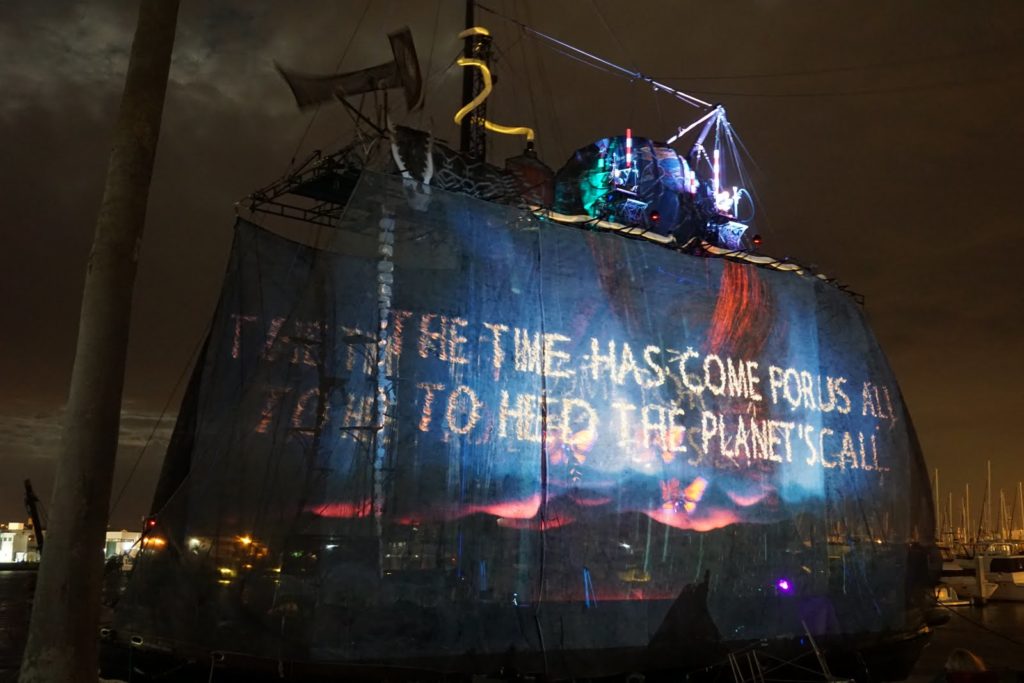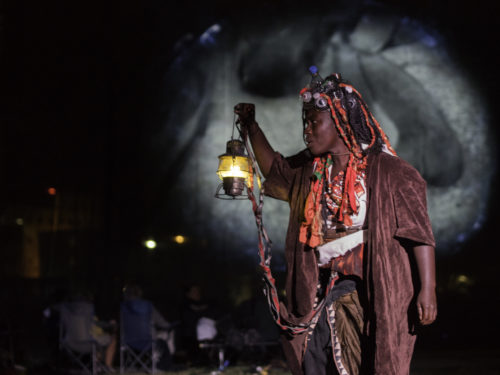
Photo credit: Jason Lloyd Watkiins
A warm breeze blew over Pontchartrain Landing, a boat harbor at the very end of France Road, where an audience assembled on blankets and beach chairs to view a multimedia show staged on a 90-ft., Tall ship, specially constructed for mounting spectacular performances on its deck, masts and rigging. The gusty, starry night recalled how ancient mariners, sailing similar vessels, had once been guided across vast oceans. Finding the way down a shadowy, winding path, audience members settled in to experience an environmental-themed, traveling gypsy circus as solo piano, cello and classical guitar music set a mythical mood and poetic messages floated on a billowy scrim, fluttering in the wind.
“Blind to Earth’s orbs climate slaughter. Warped our lives with raffish Silver.”
The Amara Zee had been scheduled to sail to New Orleans from St. Petersburg, Fla., where “Nomadic Tempest” premiered in April. Alas, its seven-day, 5 m.p.h. voyage was delayed by unpredictable winds that quickly changed from southeast to north, 18 hours earlier than forecasted. Nine-foot waves forced the flat-bottomed ship to reverse direction, returning to Florida and canceling New Orleans’ first weekend shows. The crew had to “creep the coastline” through the intracoastal waterway, stopping and starting, between weather fronts. Now, blustery weather threatened the second weekend’s performances, too.
Ironically, the theme of “Nomadic Tempest” warns of the dangers of climate change. In its futuristic, operatic story, angry seas have caused a tremendous tsunami to destroy cities, bridges and populations, leaving a few refugees surviving on rafts. In 2040, children hear the fable of Casandra’s Curse, an almost fatal disaster caused by feasting on fossil fuels. Using film, vocals in five languages, and aerial acts, “Nomadic Tempest” employs an international cast of 19 performers and crew to tell the fantastic, prescient tale.
“Nomadic Tempest” is “a continuous, cinematic panorama of originally designed video graphics, animations and images, simulating the flight paths of the Monarchs, gliding upwards of 4,000 feet above the Earth,” its website states.
Fragile monarch butterflies, portrayed by aerial artists, flee the land to avoid the harmful effects of a warming climate.
Founded by Paul Kirby and Adriana Kelder, the Caravan Stage Company has toured the United States for almost 50 years, first as a single-wagon puppet show on Vancouver Island and later as a 25-person company of actors, musicians, artists and technicians, traveling to small, West Coast towns in brightly painted wagons pulled by Clydesdale horses.
The original shows were staged in the Cosmodrome, an 80-ft. tensile tent decorated with colorful murals. Crisscrossing Canada and the United States, the company held performances in parks, schoolyards and pastures. After developing a seven-hour show about the changing environment for the World Theatre Festival, they built a $2 million, flat-bottomed barge that could navigate waterways in Europe and North America.
“We wanted to get further afield and our technology was limited by what we could carry,” said Kirby. “By this time, we knew the mythology of the showboat in a river system and a ship had more potential for spectacle theater,” Kirby says.
Over nine years, the Caravan Stage Company toured 20 countries with large audiences, creating shows with themes centered on civil rights and environmental justice.
Unfortunately and ironically for New Orleanians, extreme environmental conditions prevented the Amara Zee from bringing its full show to Pontchartrain Landing. The cast and crew are now on their way to Beaumont, Texas, for the final leg of the 2017 tour, but hopefully the winds will call them back to our shores soon.
 NOLAbeings Multimedia artist Claire Bangser created NOLAbeings as a portrait-based story project that marries...
NOLAbeings Multimedia artist Claire Bangser created NOLAbeings as a portrait-based story project that marries...  Voodoo in New Orleans: Reviving history: New Orleans fortune telling This article takes a deep dive into the history of Voodoo in New Orleans, its hybridization with Catholicism, and its present-day place in the city's culture. The author visits fortune-tellers in the French Quarter, using their guidance as a tool for introspection rather than a deterministic predictor of the future. Through her experiences in New Orleans, the author feels a mystical connection to both the past and the future.
Voodoo in New Orleans: Reviving history: New Orleans fortune telling This article takes a deep dive into the history of Voodoo in New Orleans, its hybridization with Catholicism, and its present-day place in the city's culture. The author visits fortune-tellers in the French Quarter, using their guidance as a tool for introspection rather than a deterministic predictor of the future. Through her experiences in New Orleans, the author feels a mystical connection to both the past and the future. 